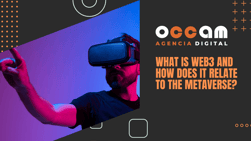Index Content
Web3 is a new way of organising and managing internet service. It is, at this stage, half myth and half reality because, although some changes are already taking place in the way the internet is used, the definition of Web3 is based on predictions and assumptions which, although they can be predicted on the basis of current evidence, are intuitions about which we cannot yet be sure.
However, the best way to understand what Web3 is is to define Web1 and Web2, its predecessors.
Web1 and Web2:
Web1 would be the first form in which the internet emerged. It refers to the way in which the internet was organised and used in its early years. This period is usually bounded between the 1990s and the early 2000s. And how did the internet work in these years?
In essence, it was a very limited resource for users. The activity of an individual was reduced to reading and consultation, i.e. very passive actions. There were still no major tools for interacting and connecting. The main activity of the network was reading.
In these years, blogs, forums and the first Internet portals became popular. The pages that were created used open protocols such as HTTP, i.e. they were not owned by any company or individual.
The evolution of the Internet, of its pages and of its users finally made it clear that the appearance and management at that time bore almost no relation to how it was in its beginnings, which led to the need to rename it.
Web2 is much more active than the previous one, it is not based on passive reading, but on creating, participating and sharing, and this is possible thanks to the appearance of websites that encouraged this type of behaviour. We are talking about the era when giants such as Facebook, Twitter and YouTube, which are still powerful today, were born.
The success of these companies means that they have almost complete control of the internet. They have a lot of control over their users: privacy, personal data, messages and conversations... all of this is in the possession of the site managers and belongs to them. And recently we have given them access to information that goes beyond the limits of their sites: our emails, our search history, etc. All so that they can generate as accurate a profile of us as possible. With this accurate portrait, they seek to find the type of advertising that best suits our tastes and behaviour.
The main form of financing for these sites is the advertising that they place on their websites. Except for some paid applications, the user does not have to pay for access. The "main currency" of this Web2 is information. Data that these pages can then sell and share even with our consent, which we have given when we signed up by accepting their terms and conditions.
Web3, the future of the internet?
It is precisely the issue of financing and monetisation of the internet that is one of the main changes between web2 and web3 that concerns us today.
As can be deduced, Web3 is the next step in the network, a new way of understanding, managing and using it. Web3 points the way to being a network built on "blockchain". A blockchain is a technology that is managed without intermediaries and that allows technological transactions to be carried out on its own account.
If there is one thing that sums up and defines this Web3 project, it is the overthrow of the great powers. Those titans that are the big companies that manage and dominate the web must lose their power and pass it into the hands of individual users. At least, they must be able to carry out their own actions, of which they must be the sole beneficiaries and, beyond that, they must also be able to obtain an economic return.
This new way of looking at the internet is based on its extension. Nowadays almost everything goes through the net, through the internet, through websites. Our main forms of communication, jobs, music, cinema, banking... Everything is done through the internet. This ethereal sphere, which nowadays occupies so much of our time, does not, however, offer us any economic benefit. The advocates of this new web speak of being paid for playing a video game, the so-called "play to earn" .
Cryptocurrencies such as Bitcoin or Ethereum would therefore play a major role in Web3, and there would be no point in earning these currencies if they cannot be reused, which is why the purchase model would also change, assimilating these currencies in the same way as other traditional currencies.
As for power and ownership, we mentioned earlier that the aim is to move away from the big oligarchs, such as Facebook or Google, to democratise the network and give the power of management and even some self-determination to each individual user. The internet should not be an area managed by large companies, but rather a profitable space that belongs to each one of us. Although rather than individually, we are talking about management by corporations and decentralised networks.
This digital economy without intermediaries would give much less importance to advertising, with other forms of monetisation gaining more weight. For example, one way of demonstrating this change would be with the transfer of information. As we said earlier, users give up their data just to access a website, without receiving anything in return other than permission to access. But the reality is that possession of this information then translates into great economic benefits for the company. In Web3, the user would obtain an economic reward for the transfer of data; all payments, of course, are in the form of cryptocurrencies, tokens or other types of currency. Another example would be shared Wi-Fi bands: as the owner of a Wi-Fi connection, you make it free for anyone who needs it to connect and, in exchange, you receive economic compensation for each person who connects through your band.
In short, it is predicted that this Web3 will be the future of the internet, although some vestiges can already be seen that support these opinions. Cryptocurrencies are receiving more and more investment and it is feasible that, due to the enormous amount of time we invest in the network, a new economic sphere will be invented (or applied, as it has already been invented) that will allow us to make this time profitable in some way.



